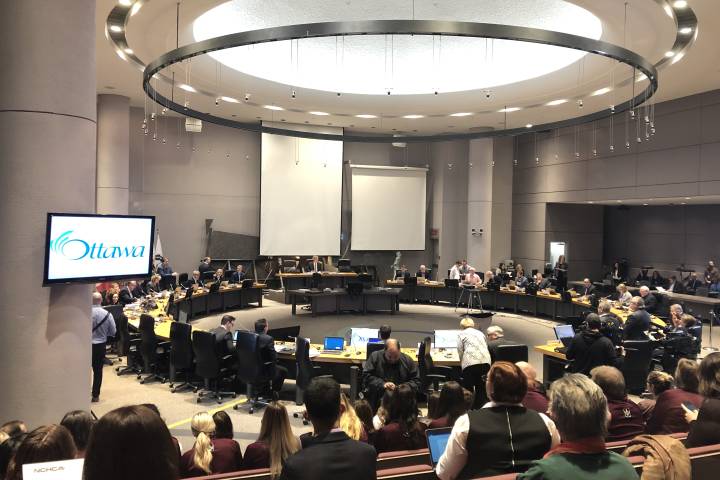

A week after receiving a report from city staff recommending Ottawa opt in to hosting retail cannabis stores, councillors are expected to decide on Thursday whether to roll out the red carpet for pot shops or take a pass.
Ottawa city council is holding a special meeting on Thursday to debate the question, armed with advice and statistics from city staff, Ottawa police, Ottawa Public Health and public opinion studies, ahead of the province’s Jan. 22, 2019 deadline.
READ MORE:
City staff recommend council allow pot shops in Ottawa
Some members of the public will also have their say on the matter ahead of the vote during Thursday’s special meeting; as of Wednesday afternoon, a dozen people had registered to speak, a City of Ottawa spokesperson confirmed.
Few Ottawa councillors have voiced opposition to the cannabis stories and Mayor Jim Watson is in favour of hosting them in the national capital.
But here some of the key facts, considerations and issues that will inform their discussion and vote on Thursday.
Economic benefits of opting in
Retail pot stores in Ottawa stand to generate millions in sales every year, according to the city. According to the staff report released last week, the city estimates Ottawa could have between 87,000 and 162,000 consumers of marijuana, who could collectively spend between $50 million and $200 million on weed and other legal cannabis-related products in 2019.
The report posited those tens of thousands of cannabis consumers and their demand could support anywhere from 34 to 69 retail stores across the city — stores that would likely create new jobs and “new opportunities for business.”
If it opts in to the stores, the City of Ottawa would also get funding from the province to help cover expenses associated with the legalization of marijuana, including police enforcement and public health work. In Ottawa, these costs are expected to hit $8 million a year, Watson has said.
WATCH: Designing a cannabis retail store

Ottawa is already slated to receive a little more than $1 million from the province in early January and if it opts in, it will be eligible for at least another $1 million, Anthony Di Monte, the city’s general manager of emergency and protective services, said last week.
Beyond that, the province is setting aside $10 million for “unforeseen circumstances” related to pot legalization. Municipalities who have opted into the stores will be prioritized among those who ask for a slice of that funding.
Plus, if Ontario makes more than $100 million in revenue in the first two years of legalization, the province has said it will split half of the surplus with the municipalities who have opted in to the retail store system.
City has no control over location of shops
If Ottawa opts in to the stores, council and residents will have to live with the fact the city won’t get any sway on where the stores are located.
All that power rests with the Alcohol and Gaming Commission of Ontario, which will accept, review and ultimately accept or decline applications for store licenses.
The province has so far established one buffer zone in law: that stores won’t be allowed within 150 metres of schools. Municipal councils will not be allowed to pass any by-laws that would increase that buffer zone or introduce a new ones.
READ MORE:
Cannabis legalization: Where you can and can’t smoke pot in Ottawa
The only time the City of Ottawa could have a say about the location of a proposed store is during a 15-day comment period after the commission receives an application. For this, city staff have proposed a list of “key principles” for providing feedback to the commission on store applications.
Among them, staff have proposed that the city automatically object to any application that:
would result in cannabis retail stores being located within 150 metres of each other, and
would result in cannabis retail stores being established within 150 metres of “any identified publicly-owned and/or operated community facility analogous to a school, such as recreational facilities, community centres, libraries and public parks, with distance to be measured from the property line.”
Watson has said he isn’t happy with how little input the city gets, but he supports having private cannabis stores in Ottawa nonetheless.
Ottawa police, public health agency back pot shops
So do the Ottawa Police Service and the city’s public health agency, according to the staff report tabled last week.
The report summarized the police’s force advice as such: there’s a proven demand for buying pot at storefronts in Ottawa, and while retail pot shops wouldn’t solve all the city’s issues related to black market sales and organized crime, they will help to undermine those problems.
“… Law enforcement intelligence experts believe that organized crime profits and their related crimes will be reduced by adopting the provincial cannabis retail model for legal storefronts,” the report says.
READ MORE:
Ottawa police execute two warrants at illicit pot shops, seize product and proceeds
From a public health standpoint, the consumption of cannabis raises a number of concerns. Ottawa Public Health, though, says if people are going to buy recreational marijuana, it’s better they do so from “a source that is guaranteed,” Di Monte said last week.
“The Medical Officer of Health advises that Ottawa residents who choose to use cannabis could have less risk to their health with access to legal products, which include approved labeling (i.e. clearly stated THC levels) and are subject to … (Health Canada) practices (that) include product testing for microbial and chemical contaminants among other requirements to ensure product quality and safety,” the staff report noted.
A divided public?
Councillors will also have to weigh public opinion on pot shops along with the recommendations from the city, police and public health and the structure of the legal cannabis regime.
An EKOS study commissioned by the city found that 48 per cent of 803 residents surveyed support retail pot shops in Ottawa, while 43 per cent oppose them — not far from an even split.
READ MORE:
Toronto staff recommend allowing cannabis retail stores to operate in city
The poll did account for residents’ views on legalization. Of the 53 per cent who said they support the federal government’s move to legalize recreational marijuana, 78 per cent of those folks said they support cannabis retail stores. Of the 38 per cent who said they oppose legalization, 83 per cent of those individuals said they are opposed to the stores.
A strong majority (77 per cent) of those who told EKOS that they expect to purchase recreational weed said they would prefer to purchase it at a retail outlet, rather than through an online store.
READ MORE:
London council committee backs private marijuana sales
Meanwhile, an online survey conducted by the City of Ottawa found much stronger support for pot shops among residents. The survey received nearly 24,000 responses, according to the city’s report; just under 16,000 of those were tied to people or IP addresses within Ottawa.
Of those 15,888 respondents, about 78 per cent said they strongly or somewhat support having private pot shops in the city and 20 per cent said they oppose it.
Ontario municipalities face January deadline
Municipalities across the province have until Jan. 22, 2019 to make a decision on private cannabis stores.
If Ottawa decides to opt in, it’s in for good; city council can’t backtrack on its decision and a future council can’t reverse it either, according to the staff report. If council opts out, it can opt in at a later date — but it can only do so once.
Regardless of whether a municipality opts in or out of the storefronts, it remains legal to consume recreational marijuana in places where smoking isn’t banned, and residents 19 years of age and older can still purchase weed online from the Ontario Cannabis Store.